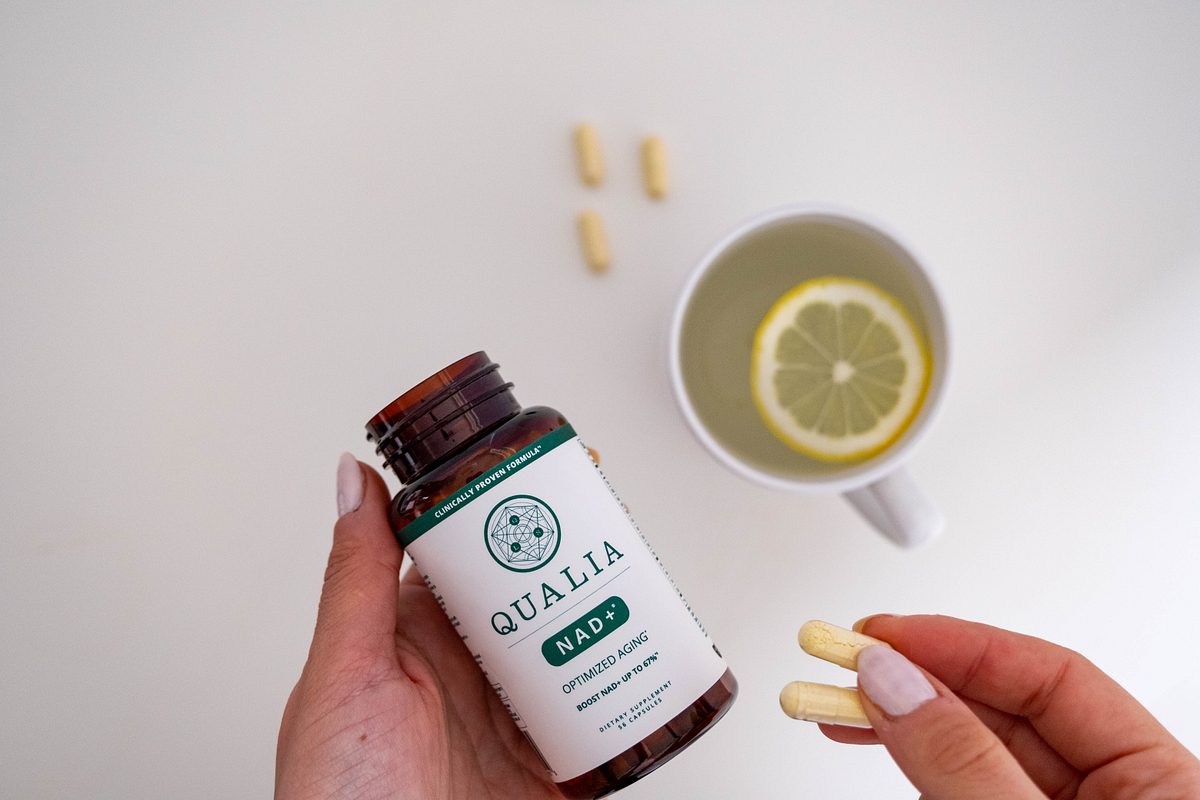Chronic inflammation is like a smoldering fire inside your body, silently damaging your organs and tissues. It’s at the root of many serious health issues, including heart disease, cancer, diabetes, stroke, autoimmune disorders, and neurodegenerative conditions.1
While this sounds daunting, the good news is you can take control. With the right strategies, you can manage chronic inflammation and protect your health.
What Is Inflammation?
Inflammation is your body’s defense mechanism, a response to injury or infection that mobilizes immune cells to protect and heal you. There are two types:
- Acute inflammation—your rapid responder. When you cut your finger or catch a cold, acute inflammation kicks in, creating redness, swelling, and warmth as it heals. Once the issue is resolved, the inflammation subsides.2
- Chronic inflammation—the persistent problem. However, when inflammation doesn’t turn off, it becomes chronic. This prolonged state starts attacking healthy tissues, leading to conditions like heart disease, diabetes, and even cancer.3, 4
The key takeaway? Acute inflammation is helpful and healing, while chronic inflammation causes long-term damage. Understanding the difference is crucial for managing your health.
Symptoms of Chronic Inflammation
Chronic inflammation can affect both your body and mind. Recognizing these symptoms is crucial for early intervention and management.
- Fatigue: A deep, ongoing exhaustion that doesn’t seem to improve with rest.
- Muscle and joint pain: Persistent aches similar to flu symptoms but lasting longer.5, 6
- Digestive issues: Bloating, cramping, or irregular bowel movements.
- Frequent infections: A result of an overactive immune system.7, 8
- Depression: Inflammation may interfere with chemicals in the brain that help regulate mood.9
- Brain fog: This can feel like a cloud is hanging over your thoughts, making concentrating or thinking difficult.
- Memory issues: Forgetting appointments or having difficulty recalling information are both associated with chronic inflammation.10, 11
What Causes Chronic Inflammation?
Chronic inflammation rarely has just one cause. It usually results from a mix of lifestyle factors and environmental influences.
A diet high in processed foods, damaged oils (like omega-6-rich soybean and corn oils), and sugar can disrupt your body’s immune balance and trigger inflammation. Obesity makes this problem worse because extra body fat, especially around the belly, releases chemicals that increase inflammation. This creates a cycle where more inflammation leads to more weight gain and vice versa.12, 13
Lack of physical activity worsens things because you miss out on the anti-inflammatory benefits of exercise, including improved mood and overall health. At the same time, chronic stress plays a significant role in keeping inflammation alive. Prolonged stress elevates cortisol and other stress hormones, impairing immune function and promoting long-term inflammation.14, 15
Environmental factors also contribute to the problem. Toxins from air, water, and consumer products can also trigger inflammatory responses. Poor sleep quality, too, increases inflammation by preventing the body from repairing itself effectively, while autoimmune diseases keep the immune system in overdrive, attacking healthy tissues.
Additionally, gut health plays a critical role in managing inflammation. An imbalanced gut can keep the immune system on constant alert, leading to widespread inflammation throughout the body.16-19
Health Implications of Chronic Inflammation
Chronic inflammation is a major contributor to many serious health conditions, making it a critical factor for overall wellness.
Heart Disease
Chronic inflammation damages blood vessels, leading to atherosclerosis, or plaque buildup in the arteries. As plaque accumulates, it narrows the arteries, restricting blood flow and significantly raising the risk of heart attacks and strokes. When arteries are blocked, they can cut off blood supply to vital areas like the heart or brain, triggering life-threatening events.20
Diabetes
Chronic inflammation is closely linked to insulin resistance, where your body struggles to respond to insulin, causing elevated blood-sugar levels and increasing the risk of type 2 diabetes. Once diabetes develops, it further fuels inflammation, creating a harmful cycle.21
Cancer
Chronic inflammation can damage DNA, which increases the risk of cancer, particularly in organs frequently affected by inflammation, such as the colon and liver. Conditions like inflammatory bowel disease raise the risk of colon cancer, while chronic liver inflammation heightens your risk of liver cancer. Managing inflammation is a crucial part of cancer prevention strategies.22, 23
Accelerated Aging
Chronic inflammation also speeds up aging, a process known as “inflammaging.”24 It accelerates cellular damage through oxidative stress, producing free radicals that harm DNA, proteins, and cell membranes. This leads to visible signs of aging—such as wrinkles, age spots, and loss of skin elasticity—while also impairing vital organs.25, 26
Over time, it can impair the function of your heart, liver, and kidneys. For instance, inflammation in your heart thickens the muscle, reducing its ability to pump efficiently. In your liver, it interferes with detoxification. As you age, your body’s ability to repair and regenerate naturally slows down, and chronic inflammation only worsens this, making it harder for your organs to recover from damage. 27-29
Solutions to Manage and Reduce Chronic Inflammation
An anti-inflammatory diet is one of the most effective ways to reduce inflammation. You’ll want to focus on nutrient-dense foods:
- Fruits and vegetables: Rich in vitamins, minerals, and antioxidants that help fight inflammation.
- Healthy fats: Omega-3 fatty acids from sources like salmon, mackerel, sardines, fish oil, and nuts (almonds, walnuts) have powerful anti-inflammatory effects.
- Protein: Optimal protein intake supports tissue repair and immune function, which can help reduce inflammation.

- Spices: Turmeric, particularly its active compound curcumin, helps reduce inflammation. This Spiced Turmeric Latte (aka Golden Milk) make a delicious way to get more of this anti-inflammatory spice.
- Plant-based foods: Leafy greens and berries provide antioxidants and additional anti-inflammatory benefits.30-32 This Berry Cobbler Protein Shake makes a delicious, protein-packed way to enjoy berries.
Lifestyle Strategies
Incorporating lifestyle changes can further reduce inflammation:
- Exercise: Regular physical activity plays a significant role in reducing inflammation. Both resistance training and walking help regulate your immune system, lower inflammatory markers, and improve overall health.
- Stress management is another essential factor as chronic stress fuels inflammation.33-35 Techniques like mindfulness, meditation, and deep breathing can reduce stress hormones, calming your body’s inflammatory response.
- Getting optimal sleep is essential for managing inflammation. Prioritizing 7-9 hours of quality sleep each night is crucial for keeping inflammation in check. Good sleep hygiene, such as a consistent bedtime and a peaceful environment, promotes restorative rest.36
- Professional support: Working with a functional-medicine doctor can help you manage underlying health conditions that might contribute to chronic inflammation. They can provide personalized guidance and treatment to address your specific concerns. Combining dietary changes, lifestyle improvements, and professional advice ensures a comprehensive strategy for reducing chronic inflammation and promoting long-term health.
How “Healthy” Foods Can Contribute to Inflammation
You already know that foods like sugar and damaged fats can fuel inflammation, but what if the “healthy” foods you eat are also part of the problem? Some of these so-called nutritious choices may quietly contribute to inflammation and hold you back from feeling your best. They may also be causing symptoms like gas, bloating, fatigue, headaches, skin breakouts, cravings, and stubborn belly fat.
If you feel like you’re eating well but still struggling with these issues, you might be dealing with hidden food sensitivities. I’ve identified the top 7 culprits—what I call Hi-FI (High Food Intolerance) foods—that are most likely to trigger these problems. In The Ditch List: 7 Foods Harming Your Health, I’ll help you pinpoint these offenders and guide you toward smarter, equally satisfying swaps to help you feel better fast.
Get your FREE copy of The Ditch List: 7 Foods Harming Your Health here.
References:
- Furman D, Campisi J, Verdin E, Carrera-Bastos P, Targ S, Franceschi C, Ferrucci L, Gilroy DW, Fasano A, Miller GW, Miller AH, Mantovani A, Weyand CM, Barzilai N, Goronzy JJ, Rando TA, Effros RB, Lucia A, Kleinstreuer N, Slavich GM. Chronic inflammation in the etiology of disease across the life span. Nat Med. 2019 Dec;25(12):1822-1832. doi: 10.1038/s41591-019-0675-0. Epub 2019 Dec 5. PMID: 31806905; PMCID: PMC7147972.
- Hannoodee S, Nasuruddin DN. Acute Inflammatory Response. [Updated 2024 Jun 8]. In: StatPearls [Internet]. Treasure Island (FL): StatPearls Publishing; 2024 Jan-. Available from: https://www.ncbi.nlm.nih.gov/books/NBK556083/
- Oronsky B, Caroen S, Reid T. What Exactly Is Inflammation (and What Is It Not?). Int J Mol Sci. 2022 Nov 28;23(23):14905. doi: 10.3390/ijms232314905. PMID: 36499232; PMCID: PMC9738871.
- Harvard Health: Playing with the fire of inflammation
- Louati K, Berenbaum F. Fatigue in chronic inflammation – a link to pain pathways. Arthritis Res Ther. 2015 Oct 5;17:254. doi: 10.1186/s13075-015-0784-1. PMID: 26435495; PMCID: PMC4593220.
- Cleveland Clinic: What Is Inflammation? Types, Causes & Treatment
- Pahwa R, Goyal A, Jialal I. Chronic Inflammation. [Updated 2023 Aug 7]. In: StatPearls [Internet]. Treasure Island (FL): StatPearls Publishing; 2024 Jan-. Available from: https://www.ncbi.nlm.nih.gov/books/NBK493173/
- Chen L, Deng H, Cui H, Fang J, Zuo Z, Deng J, Li Y, Wang X, Zhao L. Inflammatory responses and inflammation-associated diseases in organs. Oncotarget. 2017 Dec 14;9(6):7204-7218. doi: 10.18632/oncotarget.23208. PMID: 29467962; PMCID: PMC5805548.
- Han KM, Ham BJ. How Inflammation Affects the Brain in Depression: A Review of Functional and Structural MRI Studies. J Clin Neurol. 2021 Oct;17(4):503-515. doi: 10.3988/jcn.2021.17.4.503. PMID: 34595858; PMCID: PMC8490908.
- Cleveland Clinic Health Essentials: Strategies for Busting Up Brain Fog
- American Academy of Neurology: Chronic Inflammation in Middle Age May Lead to Thinking and Memory Problems Later
- UChicago Medicine: What Foods Cause or Reduce Inflammation?
- Ellulu MS, Patimah I, Khaza’ai H, Rahmat A, Abed Y. Obesity and inflammation: the linking mechanism and the complications. Arch Med Sci. 2017 Jun;13(4):851-863. doi: 10.5114/aoms.2016.58928. Epub 2016 Mar 31. PMID: 28721154; PMCID: PMC5507106.
- The Harvard Gazette: Research shows working out gets inflammation-fighting T cells moving
- Liu YZ, Wang YX, Jiang CL. Inflammation: The Common Pathway of Stress-Related Diseases. Front Hum Neurosci. 2017 Jun 20;11:316. doi: 10.3389/fnhum.2017.00316. PMID: 28676747; PMCID: PMC5476783.
- Thompson PA, Khatami M, Baglole CJ, Sun J, Harris SA, Moon EY, Al-Mulla F, Al-Temaimi R, Brown DG, Colacci A, Mondello C, Raju J, Ryan EP, Woodrick J, Scovassi AI, Singh N, Vaccari M, Roy R, Forte S, Memeo L, Salem HK, Amedei A, Hamid RA, Lowe L, Guarnieri T, Bisson WH. Environmental immune disruptors, inflammation and cancer risk. Carcinogenesis. 2015 Jun;36 Suppl 1(Suppl 1):S232-53. doi: 10.1093/carcin/bgv038. PMID: 26106141; PMCID: PMC4492068.
- Irwin MR. Sleep disruption induces activation of inflammation and heightens risk for infectious disease: Role of impairments in thermoregulation and elevated ambient temperature. Temperature (Austin). 2022 Aug 21;10(2):198-234. doi: 10.1080/23328940.2022.2109932. PMID: 37332305; PMCID: PMC10274531.
- Duan L, Rao X, Sigdel KR. Regulation of Inflammation in Autoimmune Disease. J Immunol Res. 2019 Feb 28;2019:7403796. doi: 10.1155/2019/7403796. PMID: 30944837; PMCID: PMC6421792.
- Hakansson A, Molin G. Gut microbiota and inflammation. Nutrients. 2011 Jun;3(6):637-82. doi: 10.3390/nu3060637. Epub 2011 Jun 3. PMID: 22254115; PMCID: PMC3257638.
- Pahwa R, Jialal I. Atherosclerosis. [Updated 2023 Aug 8]. In: StatPearls [Internet]. Treasure Island (FL): StatPearls Publishing; 2024 Jan-. Available from: https://www.ncbi.nlm.nih.gov/books/NBK507799/
- WebMD: Are Diabetes and Inflammation Connected?
- Waldum H, Fossmark R. Inflammation and Digestive Cancer. Int J Mol Sci. 2023 Aug 31;24(17):13503. doi: 10.3390/ijms241713503. PMID: 37686307; PMCID: PMC10487643.
- National Cancer Institute: Chronic Inflammation – Risk Factors
- Ferrucci L, Fabbri E. Inflammageing: chronic inflammation in ageing, cardiovascular disease, and frailty. Nat Rev Cardiol. 2018 Sep;15(9):505-522. doi: 10.1038/s41569-018-0064-2. PMID: 30065258; PMCID: PMC6146930.
- Baechle JJ, Chen N, Makhijani P, Winer S, Furman D, Winer DA. Chronic inflammation and the hallmarks of aging. Mol Metab. 2023 Aug;74:101755. doi: 10.1016/j.molmet.2023.101755. Epub 2023 Jun 15. PMID: 37329949; PMCID: PMC10359950.
- Cleveland Clinic: Oxidative Stress: Causes, Symptoms & Treatment
- Cleveland Clinic: Heart Inflammation: Causes, Symptoms and Treatments
- Park BJ, Lee YJ, Lee HR. Chronic liver inflammation: clinical implications beyond alcoholic liver disease. World J Gastroenterol. 2014 Mar 7;20(9):2168-75. doi: 10.3748/wjg.v20.i9.2168. PMID: 24605015; PMCID: PMC3942821.
- WebMD: How to Reduce Inflammation as You Age
- Harvard Health: Foods that fight inflammation
- Healthline: Anti-Inflammatory Foods to Eat
- Hruby A, Jacques PF. Dietary Protein and Changes in Biomarkers of Inflammation and Oxidative Stress in the Framingham Heart Study Offspring Cohort. Curr Dev Nutr. 2019 Mar 28;3(5):nzz019. doi: 10.1093/cdn/nzz019. PMID: 31037277; PMCID: PMC6483052.
- Harvard Health: Use strength training to help ward off chronic disease
- Harvard Health: Easy ways to keep inflammation in check
- Everyday Health: The Link Between Stress and Inflammation
- Ramar K, Malhotra RK, Carden KA, Martin JL, Abbasi-Feinberg F, Aurora RN, Kapur VK, Olson EJ, Rosen CL, Rowley JA, Shelgikar AV, Trotti LM. Sleep is essential to health: an American Academy of Sleep Medicine position statement. J Clin Sleep Med. 2021 Oct 1;17(10):2115-2119. doi: 10.5664/jcsm.9476. PMID: 34170250; PMCID: PMC8494094.
*These statements have not been evaluated by the Food & Drug Administration. Products mentioned are not intended to diagnose, treat, cure, or prevent any disease. The views in this blog by JJ Virgin should never be used as a substitute for professional medical advice. Please work with a healthcare practitioner concerning any medical problem or concern.






